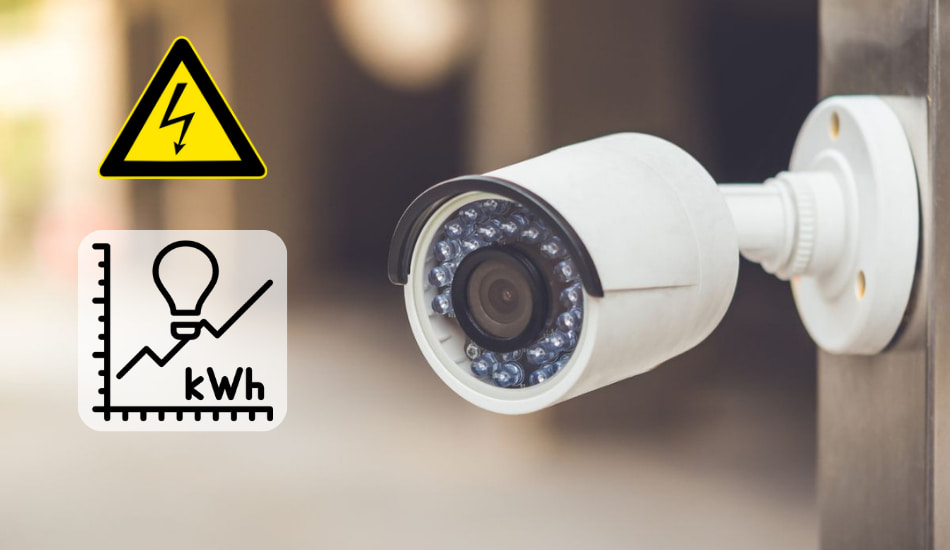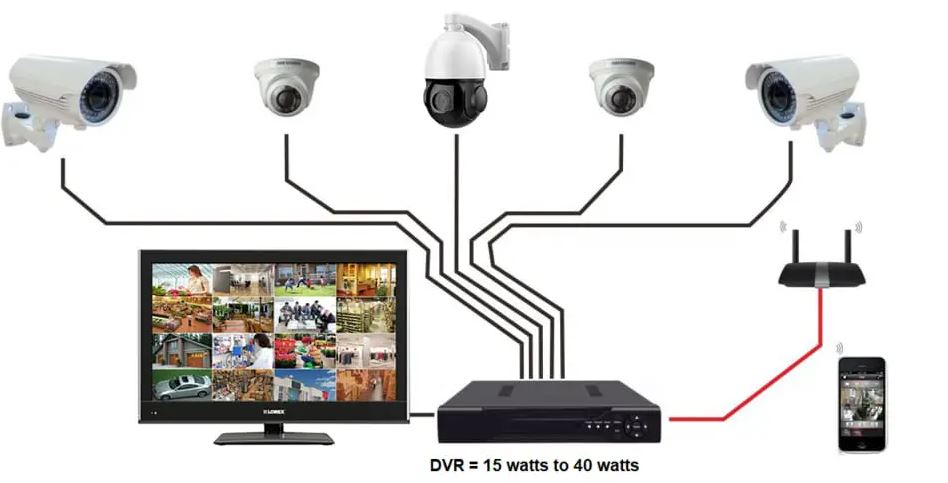CCTV Camera Power Consumption Calculator

Owning a CCTV camera system can bring a sense of safety to your home. Still, when you choose to install one, it’s important to think about the energy it uses and if this will impact your electricity bill. As these camera systems often run around the clock, they’re always drawing power.
But in reality, they are not a big consumer of energy. In this article, we will talk about the power usage of CCTV security cameras and should you worry about them. So, let’s start!
How Much Power Does A CCTV Camera Use? CCTV cameras use anywhere from 2 to 10 watts of power. For instance, a 5W CCTV camera that runs for a whole month will use about 3.6 kWh of power. This is approximately 43.9 kWh per year. Therefore, the yearly cost of electricity for running this camera would be around $10.09 in the United States.
CCTV (Closed-circuit television) cameras are becoming very popular nowadays. As we can see, the energy (power) they use is not so big, and it will not affect our energy bill. However, you need to pay attention to another thing.
Each CCTV camera must connect to a Digital Video Recorder (DVR), which records and stores video footage from the camera onto a hard drive. Interestingly, this DVR device uses more energy than the camera itself and is designed to run continuously, all day and night. In the next chapter, we’ll discuss their energy consumption in more detail.
Here are the best CCTV surveillance camera systems and their power consumption:
| Camera Model: | CCTV Camera [W] | DVR system [W] |
|---|---|---|
| 1. TP-Link Tapo C310 | 5.4 Watts | 10 Watts |
| 2. Ring Floodlight Cam | 15 Watts | 12 Watts |
| 3. Wyze Cam | 4 Watts | 10 Watts |
| 4. Google Nest Cam IQ | 13 Watts | 9 Watts |
| 5. Vivint Outdoor | 7 Watts | 13 Watts |
CCTV Camera Power Consumption Calculator

The energy usage of a CCTV camera (and also any electrical device) is primarily influenced by three key factors:
- Watts – The wattage of CCTV cameras,
- Operational Time – How long it is used (recording),
- Electricity Price – The cost of electricity in your region.
Before we start calculating CCTV cameras and their power consumption, let’s understand some basic things you need to know about how they work and why they need watts. If you’re already familiar with these terms, feel free to skip this section and go below.
Here you have an easy CCTV Camera calculator that you can use to see how much it will cost you to run it.
1. Understanding CCTV Camera Wattage
Each CCTV camera requires power to work, and that power is expressed in watts. Most CCTV cameras have between 2 and 15 watts of power. It is also important to consider that each model needs to have a DVR/NVR to work, which also requires power. The power of such devices is between 20 and 50 watts.
How to know how many Watts my CCTV Camera has?
The first place you can find CCTV camera wattage is on its label, usually placed on the back. Another way is to type its model on Google and look for it. Sometimes you’ll find a label like this: 15 VDC/550mA. If you have this, don’t worry because you can easily get a wattage. Here is how you do it:
Power (Watts) = Current (I) x Voltage (U) = 0.55 x 15 = 8.2 [W]
Note! The same thing goes for DVR/NVR wattage.
2. Electricity Price
The electricity price is the rate at which you’re charged for your electricity usage, typically measured in cents per kilowatt-hour (kWh). In the United States, the price is 23 cents per kWh. Your energy provider sets the price, which can vary based on location, time of day, and the type of customer you are (residential, commercial, etc.).
The price includes the cost of producing, transmitting, and distributing the electricity to your home or business. Here are a few ways how you can find out what is your electricity price:
- Check Your Electricity Bill: One of the most straightforward methods is to look at your most recent electricity bill. It typically shows your usage and the cost per kilowatt-hour (kWh).
- Contact Your Energy Provider: If the rate isn’t clear from your bill, or if you have any questions about calculating it, contact your electricity provider. They can explain how they determine the rate and any other charges on your bill.
- Online Research: If you’re moving to a new area and want to know the average electricity rate, an internet search on Google can help you. Some regions also have energy regulatory authorities that publish the approved rates for different providers.
Note! Electricity price can change throughout the year.
Example: Now that we know what watts are and how to get the electricity price, we will calculate the consumption of a normal CCTV camera. We have the following information:
- CCTV Camera of 5 Watts
- Running time: 24 hours per day, 7 days per week, 365 days per year.
- Electricity rate: 23 cents per kWh
The formula:
Cost = 0.005 kW x 24 hours x 365 days x 0.23 ($/kWh) = $10,07 per year
Here you can see a table with 3 types of CCTV cameras and their power consumption:
| CCTV Camera Power (Watts) | Energy Used Per Day (kWh) | Daily Cost (USD) | Monthly Cost (USD) | Yearly Cost (USD) |
|---|---|---|---|---|
| 5 Watts | 0.12 kWh | $0.028 | $0.84 | $10.14 |
| 10 Watts | 0.24 kWh | $0.055 | $1.68 | $20.28 |
| 15 Watts | 0.36 kWh | $0.083 | $2.52 | $30.42 |
Related Article: How Much Power (Watts) Does An AC Use?
How Much Does it Cost To Run A CCTV Camera?

Several factors depend on how much running a CCTV camera can cost. Some of them are the CCTV camera model, the electricity price in your area, how long it runs, and how much power the DVR/NVR system consumes. Here is a table with examples:
| Country | Electricity Price (kWh) | Cost to Run 5W CCTV Camera (per month) | Cost to Run 5W CCTV Camera (per year) |
|---|---|---|---|
| United States | $0.23 | $0.92 | $9.71 |
| Canada | $0.15 | $0.54 | $7.38 |
| United Kingdom | $0.28 | $1.13 | $10.76 |
| Australia | $0.31 | $1.21 | $12.92 |
| China | $0.09 | $0.34 | $5.48 |
Once we’ve established the wattage of our CCTV cameras, we can easily estimate how much it will cost us to run them. It’s worth noting that some CCTV security cameras have additional features like infrared (IR) night vision and IP capabilities, which can increase their power consumption by about 2 to 4 watts.
Taking the average U.S. electricity rate of 23 cents per kilowatt-hour (kWh) and adding it to the 5 watts that a typical CCTV camera consumes, we find that running a camera costs around 92 cents monthly (not including a DVR system).
However, we must remember that security CCTV cameras typically function alongside DVR/NVR systems, which consume more power, especially when operated 24/7.
In general, the power consumption isn’t huge compared to other household appliances. But the energy costs can add up for larger companies that require many cameras and associated equipment.
A Kill A Watt Meter is a great tool to accurately determine the power usage of your security CCTV camera system. With this device, you’ll be able to find out the exact cost of running your security setup in your home or business.
Related Article: How Many Watts Does A Laptop Use?
Calculate Accurate Power Consumption Of CCTV Camera

By using a Kill A Watt meter, you can easily measure the power consumption of any electrical device in your house, including a CCTV camera. If you don’t have one already, you can order it on Amazon at a very affordable price.
How to use a Kill A Watt meter?
The process is pretty simple. First, plug your device (kill a watt meter) into an electrical outlet, and connect your CCTV camera plug to it. Turn on the Kill a Wat meter and start using your CCTV camera. After you’re done, check how much electricity (kWh) was used on the device. It will show you the exact power that your CCTV camera uses. Some models will also display the price in dollars.
> Buy Kill A Watt Meter HERE <
If you are still not sure how to use this device, then check this youtube video:
How To Reduce Power Consumption Of CCTV Cameras?
While an average CCTV camera doesn’t use as much power as other home appliances, its 24/7 operation can impact your electricity bills and carbon emissions over time. One effective strategy to minimize your CCTV system’s energy use is to set the camera settings.
You might consider disabling certain features and setting the system to record only during specific time periods. Opting for basic models without ultra HD capabilities can also help reduce energy use.
Implementing quality control measures like using top-notch wires and cables can further contribute to power saving. Alternatively, you might want to consider solar-powered CCTV cameras that absorb the sun’s energy to operate.
Can a CCTV Camera Operate Without Power?

Like most electrical devices and gadgets, CCTV security cameras require electricity to work. Some CCTV camera models come with backup batteries capable of recording for a short time without power from the main grid. However, this duration is limited.
To ensure your system continues recording even during a power outage, it’s recommended to connect your CCTV system to a generator or a backup battery. This added setup will cost you, so you must evaluate its importance and necessity based on your specific needs.
Related Article: Do Smart Bulbs Use Power (Electricity) When Off?
FAQ: People Also Ask
Do CCTV cameras use a lot of electricity?
A normal CCTV camera uses anywhere between 4 and 15 watts of electricity, which depends on the model of the camera. The Digital Video Recorder (DVR), consumes between 10 and 40 watts. Overall, they don’t consume a lot of electricity which will affect your energy bill.
How many amps does a 12V CCTV camera use?
A regulated 12V DC power source supplies 2 amps of power to this camera. The power source needs an input of 100-240VAC at 50/60Hz.
Can I use CCTV without electricity?
No, CCTV systems require electricity to work. However, CCTV cameras can be connected to a backup system that is independent of the home power supply. This allows them to record and store footage for some time, depending on the battery’s capacity, even when no power is available.
Final Thoughts
Although CCTV cameras consume only a minor part of total home energy, it is good to know how much that is. This article shows that the average CCTV camera consumes about 5W per hour, which is very little compared to other household appliances (almost negligible).
However, the DVR system consumes much more energy, and it is an essential part of the CCTV camera to function, which consumes about 3-4x more energy, but in the end, this is also negligible. I hope this article helped you, and if you have any questions, feel free to write.
